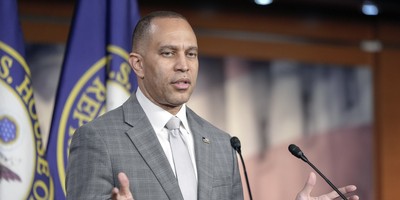Success! The Obama administration announced over the weekend that it had hit its deadline of Nov. 30 for HealthCare.gov.
Of course, there were caveats. The site will still probably get buggy when there's a lot of traffic, which is why Health and Human Services Secretary Kathleen Sebelius advised people to use it at off-peak hours. But that simply means peak hours will be moved to after midnight. After all, you don't alleviate crowding if you tell everyone to try a different door.
Oh, and there will still be crashes, and occasionally the administrators will have to take the whole thing offline. But, HHS insists, the "user experience" will be boffo for the majority of users.
There's still one hitch. HealthCare.gov doesn't work, at all. Sure, it provides a remarkably realistic user experience, but as of now it's basically a video game. A really, really boring video game. Call it Sim Healthcare.
This is because the so-called back end essentially doesn't exist. That's the part of the site that talks to the insurance companies, processes payments and actually, you know, gets people enrolled on insurance plans.
Reports vary on whether it needs to be "fixed" or whether it still needs to be built. On Nov. 19, Henry Chao, the administration official in charge of overseeing the site, told Congress that "the accounting systems, the payment systems, they still need to be" created. Going by the rosy version of Chao's estimate, that was roughly 30 percent to 40 percent of the system.
"It's not built, let alone tested," one insurance executive told the Washington Post last week.
Meanwhile, the New York Times reported Sunday that the back-end systems "that are supposed to deliver consumer information to insurers still have not been fixed." I'm not clear on how you can fix something that hasn't been built yet, but maybe in the 11 days between Chao's testimony and the Nov. 30 deadline, the "A-Team" President Obama deployed built the back end enough for it to be recognizably broken.
Recommended
Either way, it's not working. Think of it this way: Would you consider an ATM machine to be functional if it created a lifelike experience but didn't actually do anything with your commands? No money comes out, no deposits get credited, no transfers actually work, but the screen just tells you that everything worked?
Now, that's a bit harsh, of course. Insurance companies say that some people have successfully navigated the digital gauntlet. The White House's stated goal was to get to the point where 80 percent could complete the process, which is a standard of success that accepts 1 in 5 people failing. If you knew an ATM machine wouldn't work for every fifth person who used it, would you still stick your debit card in it? How about after you were told by legions of security experts that there was no way the information you entered could be handled securely?
In its triumphant progress report, the administration declared that the effort was now proceeding with "private sector velocity and effectiveness." That's adorable. A project that was sold as tangible proof of the intellectual and managerial competence of liberalism utterly fails after more than three years and $1 billion, and now the administration is bragging that it stepped up its game to the standards of the nongovernment sector.
The problem is that in the private sector, the ability to process payments is a big priority. Creating a more enjoyable user experience is nice, but the back end is where the action is. You know where the private sector has worked with real velocity and effectiveness? Sending out millions of insurance cancellation letters.
The most remarkable thing about Sim Healthcare is how it serves as an analog to liberalism in the age of Obama generally. The president talks a wonderful game about inequality, shared responsibility and the general superiority of liberal economic policies. It's all uplifting, particularly for the extremely rich liberals who've gotten even richer under Obama but who feel like they are staying true to the cause by cutting checks to the Democrats. (A New York Times study found that between 2009 and 2011, income inequality grew four times faster than under George W. Bush.)
Sim Healthcare seems like a smashing success so long as the results don't matter, just like Sim Liberalism.

























Join the conversation as a VIP Member